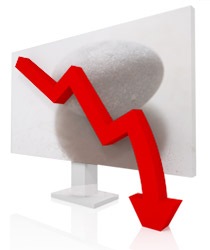There’s increasing agreement that the US economy is already in recession.
 Interestingly, we can’t know for sure because the statistics used for the formal definition (a decline in a country’s gross domestic product, or negative real economic growth, for two or more successive quarters of a year) take around six months to compile.
Interestingly, we can’t know for sure because the statistics used for the formal definition (a decline in a country’s gross domestic product, or negative real economic growth, for two or more successive quarters of a year) take around six months to compile.
What’s different this time compared to previous recessions in 1990 and 2001 is that more large organizations are equipped with robust business application suites and information systems that allow them to obtain and communicate leading indicators of consumer spending.
Earlier this month, the CEO of AT&T, a large and advanced user of business intelligence systems, announced that customers “aren’t paying their bills and getting cut off“.
This immediately led to a 4.5% drop in the stock price but perhaps more importantly was widely reported as a harbinger of the poor state of the economy (e.g. “The Economy Sucks“).
The Power of BI Goes Way Beyond the Enterprise
If anybody has ever had doubts about the importance of BI, here’s an example of where a single enterprise KPI has hastened the recognition of the recession and (since consumer expectations are a vital part of the economic cycle) maybe even worsened its effects.
A standard theme of presentations in our industry is that key performance indicators must be communicated across the entire organization, from the CEO to the front line. And I’ve personally done hundreds of presentations over the last decade that extend on that theme to explain the importance of greater information sharing between organizations to improve transparency and performance.
But have we been aiming too low? The AT&T example is a glimpse of the future, where the business cycle and the economy itself is informed (and driven?) by those same enterprise KPIs…
